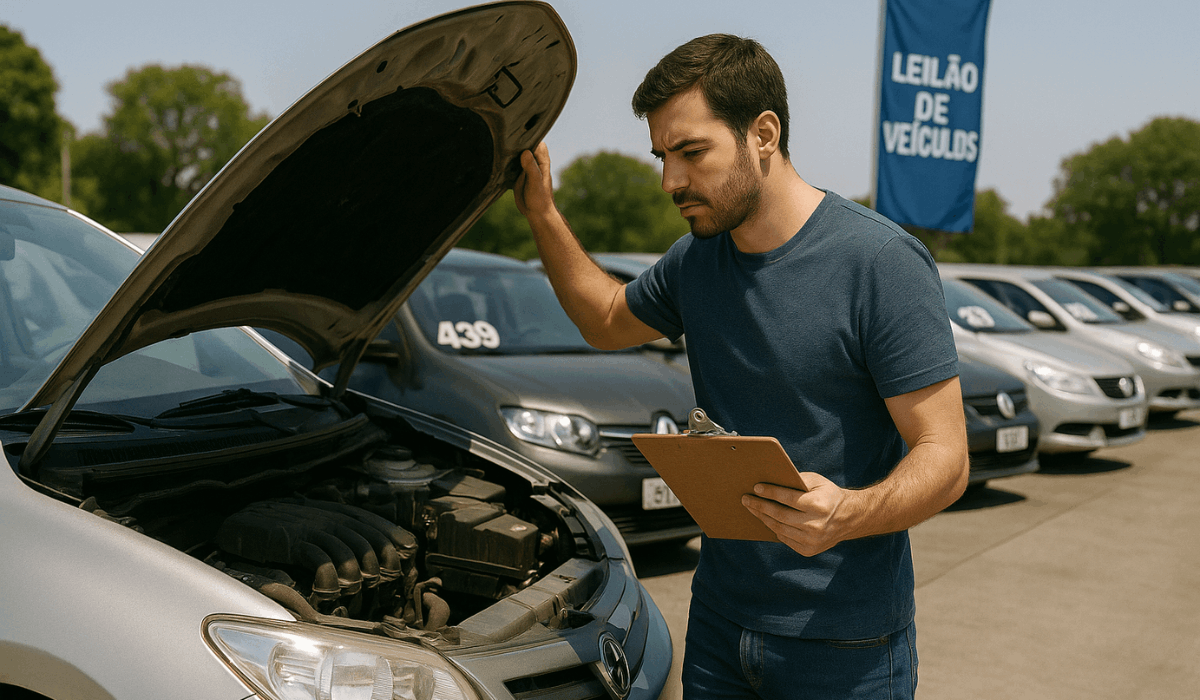Car auctions in Brazil have become an increasingly popular way to buy vehicles at prices below market value.
They attract both individual buyers and small dealers looking for affordable opportunities.
However, to make a smart purchase, you need to understand how auctions work, what fees apply, and how to complete the transfer process safely.
Understanding How Car Auctions Work in Brazil
Car auctions in Brazil allow buyers to purchase vehicles that banks, insurers, or government agencies have made available for sale.
These events can be held online or in person, offering discounted prices but requiring attention to legal and procedural details.
What a Car Auction Is
A car auction is a public sale where vehicles are offered to the highest bidder, usually after being repossessed, seized, or written off by insurers.
It’s a fast and transparent way to sell or buy cars, but buyers must carefully check each vehicle’s condition and documents before bidding.
Main Types of Auctions in Brazil
There are several types of car auctions in Brazil, each designed for different kinds of buyers and vehicles.
Knowing the differences helps you choose the safest and most suitable option for your budget and purpose.
- Judicial Auctions: Organized by the courts to sell seized or repossessed vehicles.
- Extrajudicial Auctions: Conducted by banks, finance companies, or leasing firms to recover debts.
- Insurance Auctions: Include cars written off or recovered from accidents and thefts.
- Corporate or Fleet Auctions: Sell used vehicles from company fleets or rental agencies.
- Online Auctions: Allow you to bid remotely through official platforms without attending in person.
- In-Person Auctions: Require physical presence at a designated location to place live bids.

How to Register and Participate
To join a car auction in Brazil, you must register and follow a few quick steps. Doing it correctly ensures your bids are valid and avoids problems later.
- Register Online: Use your CPF, ID, and address to create an account. Read and accept the auction terms (edital).
- Pay the Deposit: Send a refundable participation fee to confirm your spot.
- Verify Documents: Upload your ID and proof of address for approval.
- Join the Auction: Bid online or in person within your set budget.
- Complete Payment: Pay the total amount and fees if you win, then arrange pickup and transfer.
Fees and Extra Costs
Buying a car at auction in Brazil costs more than the winning bid. You must plan for extra fees that raise the total price.
Knowing them helps you budget and avoid surprises.
- Auctioneer’s Commission: Usually between 5% and 10% of the final bid, paid directly to the auctioneer.
- Administrative Fee: Covers auction platform or paperwork expenses, often a fixed amount stated in the edital.
- Taxes (IPVA and Transfer): If not paid by the previous owner, you’ll need to settle outstanding IPVA or transfer fees before registration.
- Vehicle Inspection Cost: A mandatory inspection fee for safety and emissions testing before transfer.
- Documentation and Licensing Fees: Includes CRV/CRLV issuance, ownership transfer, and notary costs.
- Transport or Tow Costs: If the car cannot be driven, you’ll pay for towing or vehicle transport to your location.

Inspecting Cars Before You Bid
Before placing any bid in a car auction in Brazil, it is essential to inspect the vehicle.
This step helps you avoid hidden problems, understand the real condition, and ensure your purchase is worth the investment.
- Check the Vehicle Report: Review the official inspection report for details on accidents, mileage, and maintenance history.
- Look for Structural Damage: Check for frame damage, rust, or poor repair work that may affect safety or value.
- Confirm Vehicle Identification Numbers (VIN): Make sure the chassis and engine numbers match the documents.
- Verify the Documents: Use Detran and Renavam to confirm there are no fines, liens, or legal restrictions.
- Inspect in Person if Possible: Visit the auction yard to see the car up close; photos may hide damage.
- Bring a Mechanic or Expert: A professional can spot mechanical or structural issues that aren’t listed in reports.
What Happens After You Win the Auction
Winning a car at auction in Brazil is just the beginning of the process.
After your bid is accepted, you must complete payment, prepare documents, and follow the steps for vehicle transfer and pickup.
Acting quickly ensures you don’t lose your right to the purchase.
- Payment Deadline: Pay the full amount and auction fees within the period stated in the edital, usually 24 to 72 hours.
- Proof of Payment: Send the receipt or bank confirmation to the auction house to validate your purchase.
- Scheduling Vehicle Pickup: Arrange a date with the auction yard for vehicle collection after payment approval.
- Document Verification: Make sure you receive all legal and ownership papers for registration.
- Transfer of Ownership: Visit Detran to transfer the car to your name and get a new CRV/CRLV.
- Inspection and Insurance: Complete mandatory inspection and consider insuring your vehicle before driving.
Who Should Consider Buying at Auction
Buying a car at auction in Brazil isn’t for everyone. It’s ideal for certain types of buyers who understand the risks and know how to handle the process.
Here are the profiles most suited to this kind of purchase.
- Experienced Car Buyers: People familiar with vehicle inspection and market values.
- Auto Mechanics or Enthusiasts: Those who can repair or assess vehicles themselves.
- Used Car Resellers: Buyers looking to resell cars for profit after fixing them.
- Budget-Conscious Buyers: Individuals who want a low-cost car and don’t mind minor repairs.
- Fleet or Business Owners: Companies that need multiple vehicles at reduced prices.
Pros and Cons
Buying a car at auction in Brazil offers several advantages but also comes with risks.
Knowing the pros and cons helps you decide if this method suits your budget and expectations.
Pros:
- Lower Prices: Cars often sell 20–40% below market value.
- Wide Selection: Access to various brands and models, including newer cars.
- Quick Purchase: Auctions move fast, allowing immediate deals.
- Potential Profit: Ideal for reselling or flipping vehicles.
Cons:
- No Warranty: Vehicles are sold “as is”, with no return policy.
- Hidden Damage: Some cars may have mechanical or legal issues.
- Extra Fees: You’ll pay auction and transfer costs beyond the bid price.
- Limited Inspection: You can’t always test-drive or inspect thoroughly before buying.
Trusted Auction Platforms in Brazil
Choosing a reliable auction platform is crucial. A trustworthy site reduces risks like fraud or hidden problems.
Below are some platforms known for legitimacy and experience in Brazil.
- Copart Brasil — major online and physical vehicle auctions.
- VIP Leilões — well-known for used and “sinistro” (damaged) vehicle auctions.
- Sodré Santoro — traditional auctioneer with both physical and online presence.
- Superbid — handles vehicles, equipment, and more in Brazil.
- Loop Leilões — offers hybrid (online + in-person) vehicle auctions.
- Ayvens Carmarket — auction/tender platform for used cars in Brazil.
Final Tips and Conclusion
Before joining a car auction in Brazil, take time to research the platform, read the edital, and scrutinize the vehicle.
Planning helps you avoid mistakes and make a confident, informed purchase.
Start exploring trusted auction sites today and take the first step toward buying your next car at a great price.









